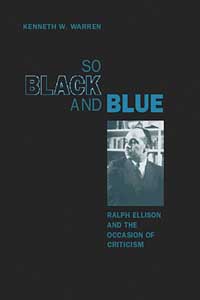Warren questions relevance of black arts, culture as political guides
By Seth SandersNews Office
  |
Kenneth Warren, Professor in English Language & Literature and the College, addressed a disturbing question in his recent keynote talk at the Chicago Humanities Open House. Titled “The Humanities and the Problem of Partisanship,” Warren questioned whether the habits of mind associated with the humanities could effectively counter the partisanship of contemporary politics. Art and the humanities may not be reliable political guides. He also has put this problem in a sharply focused written form, asking whether an appreciation of the liberating power of black music and writing might not be misdirected.
Last month the University Press published Warren’s new book, So Black and Blue: Ralph Ellison and the Occasion of Criticism, which is described as “the best work we have on Ellison in his combined roles of writer, critic and intellectual.” The book examines the complex reasons why Ellison’s novel Invisible Man, which captured and hoped to transform the realities of race in mid-20th-century America, perhaps shouldn’t be a classic.
One of the reasons Ellison’s book casts so much light on the role of race in American history is its focus on a neglected chapter of that history, said Warren. “The Reconstruction has to a great degree been overlooked in the history of the country. It represented the first time the United States made an attempt to incorporate former slaves as full citizens. The overthrow of those efforts by southern racial reactionaries and the acquiescence of northern liberals had enormous effects on modern society and the assumptions undergirding Afro-American politics. If up to that point, the primary point of attack for pushing full citizenship rights was in the political sphere, the choking off of access to that sphere, especially for the elite of black Americans, resulted in an assumption that battles for citizenship would have to be fought on a cultural front rather than a political front.”
Warren explained how Ellison embodies the problems that come with seeing culture-especially music, but also novels-as one’s main political tool. “There’s no gainsaying that music is a powerful instrument for expression-it affects the way we experience our very being-but what has been significant in discussions of African-American political and cultural agency is how prominent discussion of music has become. It’s for reasons that are easy to see and understand, but those reasons have had detrimental effects on our discussion and understanding of politics,” said Warren.
The critical obsession with black people as culture-makers has resulted in writing that is still absurdly trying to “prove” that black people are fully human, Warren argued. “Ralph Ellison’s recourse to blues and jazz is in part made to foreground the extent to which the Negro developed a culture within slavery and under Jim Crow that was not merely reactive to oppression but showed the Negro as a fully functioning human being. This was important in light of ideas in the social science of his time, which tended, for progressive reasons, to see the Negro as a being who had been fully created by oppression. Ellison found it necessary to insist that the Negro had made a life and maintained his quality and existence as a human being.
“What is disturbing about that cultural turn is that it makes a project of continuingly discovering and rediscovering what should already be assumed, that these individuals are human. Even in the more sophisticated cultural studies critiques, you tend to find this breathless celebration of the fact that these people make meanings, make their own choices-that they are human. If you already assume that going in, finer-grained questions emerge. Not ‘are those people human’ but ‘how do they go about making sense of their own situation?’ Politically you’d move from a posture where you-as the sophisticated, sympathetic analyst-look at their lyrics and fashion and tell everybody what it is they’re trying to say, to one where you assume instead they’re able to say what they want and are part of the polity rather than assuming they’re outside of it and need your help to get inside.
“What’s fascinating about Ellison is he was, on the one hand, one of the most astute critics of these attempts to ‘rediscover’ the humanity of the Negro. He at once praised and criticized Faulkner on that score, since Faulkner assumed the Negro was human, but also could partake in this heroic ‘discovery’ of black humanity.”
Ellison sometimes reduced black people to “performers,” too. “When I began thinking seriously about this problem in relation to Ellison, I realized he sometimes became a victim of this dynamic, as well. He was so aware of the failings of sociology, which tended to presume that black people could be no more than the sum of their experiences under oppression, that in opposition he sometimes embraced that ‘cultural’ definition of the Negro-one that looks like modern cultural studies’ claims about the role of art in black life and politics.
“The problem Ellison was left with is a problem we’re still wrestling with as a society. If your sense of identity was forged under conditions of oppression, conditions that you are working hard to alleviate and change, what happens to that sense of identity and the cultural expressions developed while coping with your oppressive conditions when you succeed in overthrowing those conditions? Wouldn’t you expect dramatic changes in the culture you have developed and come to respect and love when the conditions change?
“One of the older arguments about culture in American democracy was the idea, or even fear, that a rapidly changing society would not be able to produce a set of cultural artifacts that would remain vibrant and important and relevant as society changed quickly. Could you have a classic American literature when you have a society that is rapidly transforming itself, one would hope, for the better?
“We still have the problem of race, which helps give Invisible Man and Huckleberry Finn and Absalom! Absalom! their greatness. But if you take the mission of political change seriously, which these books did, then what you have in a quite interesting way is a book that has to in some sense contemplate the conditions under which it would no longer be an important work, because it would in some sense be remaindered by the social vision which it imagines.”
Warren earned his Ph.D. from Stanford University in 1988 and has been teaching at Chicago since 1991. He is the author of Black and White Strangers: Race and American Literary Realism (also published by the University press), among other works.
![[Chronicle]](/images/sidebar_header_oct06.gif)